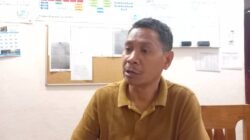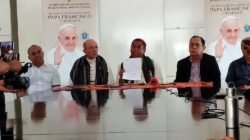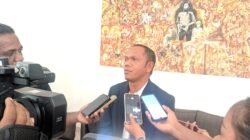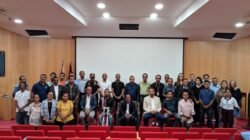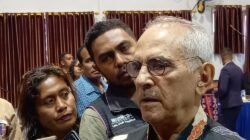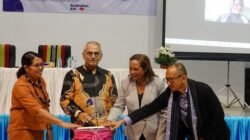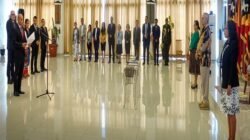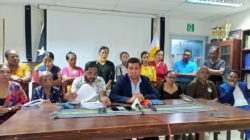By Roy Trivedy/June 2021
UN Resident Coordinator Timor-Leste givesa personal account of the circumstances and elements that shaped his unflinching commitment to financial inclusion. He tells usthe story of his mother,who played acrucialrole in the economic uplift of the household when the family migrated to the United Kingdom in the ‘60s. The turning point came in their liveswhen she wasable to open her separate bank account, manage her earnings and the family’s finances. “This led to what we are today. If my mother had not taken the finances into her own hand, we would not have reached where we are now”, reflected Mr Trivedy.
Last week I participated in the launch of the Timor-Leste Financial Inclusion Report 2020. The event was organised by the Banco Central de Timor-Leste (BCTL) where I met with and heardviews of colleagues and friends from the financial sector, including Coordinating Minister of Economic Affairs H.E. Joaquim Amaral, Director of the Alliance for Financial Inclusion Dr. Alfred Hanning, the Central Bank GovernorMrAbraão de Vasconcelos and Central Bank Deputy Governor,Ms Nur Aini Alkatiri.
It was a great honour to be invited by the Governorof the Central Bank, Sr Abraao de Vasconcelos, to make some remarks at the launch event.
The third Financial Inclusion Report 2020 shows the substantial progress that has been made in Timor-Leste over the past two years. The Report contains updated information about the supply of financial services in the country and summarises the results of the ‘demand’ for financial services from different groups of people in the country. The Report brings together in one place a lot of vital information about financial services in the country – what has been achieved and areas where further progress is required. I conveyed appreciation and thanks to everyone involved in putting together this very informative Report in my remarks.
My remarks primarily focused on the progress that has been achieved and areas where it would be helpful to focus more attention to achieve further and faster progress on financial inclusion in Timor-Leste. However,I began my presentation by sharing my personal experience of the transformational power of financial inclusion and why I am a strong believer that financial inclusion matters.
My family emigrated to the UK from Kenya when I was approximately 10 years old. My father was a trained accountant and worked as a Company Secretary. My mother was around 40 years old when we moved from Kenya. Before we arrived in the UK my mother had always worked at home as a ‘housewife’ she spoke little English and had missed most of her schooling (because my parents were married when they were both very young). When we moved to the UK, my family could not live easily on just my father’s salary and so my mother had for the first time in her life find formal employment. At that time in the late 1960s and early 1970s it was possible to find ‘low skilled’ jobs in the city where we settled. My mother was fortunate to find a job at a local factory which made ‘do it yourself’ building products for households.
Initially for the first 5 years, each Friday my mother used to handover her week’s earning to my father (who would manage the family’s finance) and in return my father would give some of the cash back to my mother so that she could purchase food and other items that the family needed. After several years of this, it soon became apparent to all of us that despite my father and mother’s earnings, the family was not able to build up any significant savings. It was at that time that my older brother and I (both in our teens) persuaded my mother to open a Building Society account. Initially, my father was angry about why my mother had opened a separate account – he argued strongly for continuing the practice of having just one bank accountfor the family (that he controlled). But with the support of her children my mother kept the account and rather than handing over all her weekly wage to my father, started saving part of her earnings. Many years later, my father was the first to admit that my mother had done the right thing when she opened her savings account. She managed to save thousands of pounds and used her savings to support the family.
This experience helped to change my family’s economic situation, and the experience of opening a bank account (or Building Society account) was instrumental in shaping my personalcommitment to the issue of financial services. That is why I am a passionate supporter of financial services. I believe they can not only support the development of individuals and families but also contribute to the development of nations!
So what does the latest Financial Inclusion Report for Timor-Leste say? Firstly, it emphasisesthe point that understanding market dynamics and client needs is essential for financial inclusion. People won’t use digital services if they do not understand those services or the services provided aretoo expensive.
Different groups of people have different needs. Women and young people have different financial needs to men and retired people. Veterans, students, farmers, members of cooperatives and market traders all have specific needs and require different types of financial products. Those living here in the capital city (Dili) will also have different needs compared to those living in rural areas. So financialservice products need to be adapted to respond to the very specific needs of different groups of clients in the country.
Without a nuanced understanding of the demand for financial services, it ischallenging to create the right savings, credit, insurance or payment products that meet people’s needs and help them improve their lives or grow their businesses and achieve their goals.
The Report also highlights several important facts that can now be used by stakeholders to plan their future actions in accelerating financial inclusion in the country, such as:
- The significant improvements on access points: increased coverage inSucos, and for the first time, all Administrative Posts (states) are covered by at least one type of financial service access point;
- The impressive growth of e-wallet services with more than 3,000 agents and 86,000 registered clients in 2020;
- The modernisation of the National Payments System: interoperability of ATMs and connect e-wallet services to banks, allowing clients to transfer money from bank accounts through their e-wallet accounts;
- The moderate increase in usage of bank services;
- The implementation by the Timorese Government and the BCTL of a Credit Moratorium Program in 2019 to support the economy and in particular,businesses and households affected by the COVID-19 outbreak.
- The launch by BCTL of “Digital Village” awareness campaign to promote digital financial services among Timorese in rural and urban areas.
The Report highlights the need to improve financial literacy in Timor-Leste. Although 64% of Timorese adults, overwhelmingly salaried employees, have an account with a formal financial institution (Banks, Other Deposit Taking Institutions – ODTIs or Fintech providers) due to a lack of awareness and knowledge, a large proportion of the population is unable to access formal financial services that provide them with the means to create sustainable livelihood opportunities, making better choices, to improve their lives. The Report shows that more efforts are needed to focus on digital and financial literacy and customer awareness in terms of products, services, and eligibility criteria to improve access to formal financial services.This requires financial service providers to work more closely with education service providers and others.
Ultimately, the promotion of financial inclusion is a collective responsibility. Government plays an important role in regard to creating a favourable enabling environment; the private sector plays an important role through technological innovation and tailored business models; development partners have a role in emphasising the importance of access to finance through their engagements; and civil society plays a role by providing support, knowledge and oversight.
As many families struggle to rebuild their lives, post COVID-19 and the floods, the need for good financial services is a vital part of national efforts to ‘build back better’.
This Report brings together many stakeholders with the aim of accelerating access to financial services in Timor-Leste. My hope is that it will contribute to unleashing the transformational power of financial inclusion to improve the lives of the Timorese people.
The UN family, and particularly dedicated agencies such as the UNCDF, stand ready to work together with the Government and Central Bank of Timor-Leste, and indeed all partners to help achieve BCTL’s financial inclusion vision “To create an inclusive financial system that brings the benefits of financial services to all, including unbanked people and communities, towards the objectives of reducing poverty and enhancing shared prosperity”, and help achieve the country’s development aspirations.(****)
990 total views, 9 views today







Bele hare Video Seluk :



 Subscribe to Timorpost
Subscribe to Timorpost